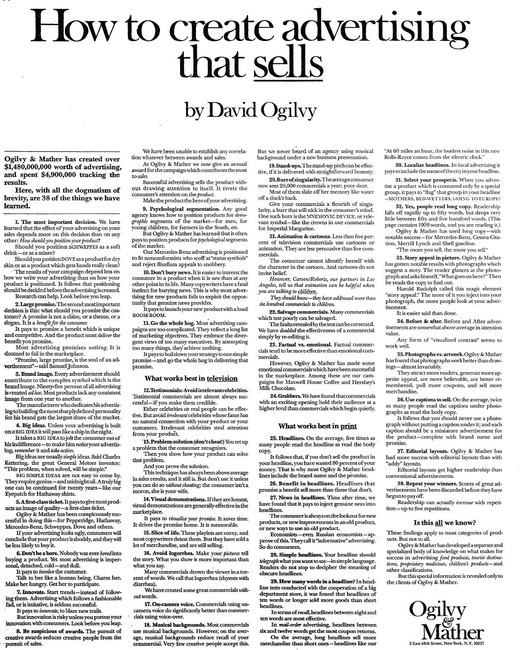Any intelligent fool can make things bigger, more complex, and more violent. It takes a touch of genius—and a lot of courage—to move in the opposite direction.

You’re reading Signal v. Noise, a publication about the web by Basecamp since 1999. Happy !
Any intelligent fool can make things bigger, more complex, and more violent. It takes a touch of genius—and a lot of courage—to move in the opposite direction.

It’s difficult to be open-minded. It’s really damn hard to be open-minded and a Graphic Designer. If a Graphic Designer claims to be open-minded they are bullshitting you.
Basically, if a Graphic Designer thinks those Amish Fireplace Mantle ads are beneath them — well then I’m afraid they aren’t open-minded.

1,900 word ad “How to create advertising that sells” written by David Ogilvy that ran in newspapers in the 60’s and 70’s for Ogilvy & Mather.
It’s crazy that actually being able to email your doctor is still so unusual in this day and age. It’s one of the many “bizarre habits that have been ingrained” in the world of primary care, according to Dr. Tom X. Lee. And that’s why Lee started One Medical Group, which offers personalized “concierge” care to patients for $200 a year.
We start by offering same-day appointments that you can schedule conveniently online. In the office, we respect your time by meeting with you on schedule so you know you’ll be back to work on time. We also believe in building more personalized relationships with our patients, so we offer longer visits which means you have more high-quality time with your doctor. And after your visit, our online services make it simple to contact your doctor and even renew prescriptions without coming in for a follow-up visit — saving you both time and money.
When Lee started One Medical Group (OMG?), he said, “it was very clear that health care organizations were lacking both the service hospitality mind-set of hotels and the operational efficiency you’d see in manufacturing industries.” It now has several thousand patients and a growth rate of 50 percent a year, gained mostly by word of mouth.
Letting customers schedule appointments online also helps the company be more efficient. Most primary-care offices have at least four administrative employees per physician. OMG has cut that ratio in half.
Hello Health
Hello Health is another medical provider attempting to tackle the various unpleasantries of the typical doctor’s appointment. Some of the features of Hello Health:
Online Scheduling
The Online Availability Calendar lets you schedule appointments from anywhere.Secure Email
A safe and convenient way to communicate with your healthcare provider.Prescription Renewal
Request prescription renewals online and for pick up at your pharmacy.Secure Instant Messaging
Text-based, a simple way to access your healthcare provider.Video Visits
Meet face-to-face with your provider without leaving home.Lab Results
Save time and review test results and other important information online.
Hello Health emerged from the house calls and same-day “e-visits” of Dr. Jay Parkinson, a NYC doctor. When he launched his practice, Parkinson accepted PayPal, but not insurance. 300 patients signed up in the first three months. He said, “I run this entire thing off my iPhone and a laptop. I can access any patient records from my iPhone. Patients can make an appointment on my Web site and it’ll text me and I’ll go see them. This is, to me, what’s missing from medicine: personalized attentiveness.”
“The Doctor of the Future” talks about the evolution of Parkinson’s system. At Hello Health, patients pay a $35 monthly subscription fee and $100-200 an hour for online or office visits. Brief email queries are free.
There’s no receptionist, so doctors greet patients as they arrive. And patients can rate visits too. “You can rate a visit, comment on it, share it,” Parkinson says. “Is that innovative? Man, I don’t know. It’s paying attention to what’s awesome about Flickr and then doing it.”
Seems strange that bringing simple basics like email/live chat access and customer ratings to an industry can still be considered “groundbreaking.” So it’s nice to see companies like these challenging the status quo and picking a fight. The health care industry could use the shakeup.
There are a bunch of rich people and firms subsidizing tech entrepreneurs, but this time the entrepreneurs are better,” says David Lee, managing partner of SV Angel, which provides seed money for tech start-ups. “These companies have millions of engaged users or actual profits. It’s not just sloppy money coming to the table.
In this Mixergy interview titled “Blasphemy & Revelation,” David Heinemeier Hansson explains his distaste for the tech world’s “swing for the fences” approach to business and why he feels it’s important to speak up about it.
The problem with swinging for the fences
Some ideas are so large and such a big gamble that either they’re going to be a flop or they’re going to be an amazing success. It seems like the vast majority of the tech startup community is working on that side of the idea fence. But I think people should also work on low risk, practical ideas.
I don’t have a trader’s mentality: “We are huge one day. We are down. We are huge. We are down.” I’d rather just have nice, steady, predictable growth. I believe in the beauty of compound interest. We might not be growing 2000%, but if we can just keep our nice, solid growth for a couple of years, that’ll compound to have quite an impact.
The startup scene is too focused on “swing for the fences” type of ideas, either it’s going to go bust or it’s going to be this lavish, extreme success. I think we’d be better off with less of a focus on that and more of a focus on practical solutions to less grandiose problems.
The different kinds of risks
I think it’d be better if there was more “considered” risk taking. It’s not that you shouldn’t take any risks at all. Starting any company of any kind, even if you’re sure that it solves a problem for somebody, is going to be a risk. There’s a fair chance it won’t work.
But there are different kinds of risks. There’s the “1 in 10,000” or “1 in a 1,000,000 chance” of making something. And then there’s a “1 in 7 chance” or “1 in 14 chance.” I’m more in the “let’s take a 1 in 7 chance” rather than the “let’s take a 1 in 10,000 chance” category.
I get annoyed at the destruction of wealth, the creative inefficiencies. But it’s also deeper than that. It’s the corruption of youth. These “swing for the fences” kind of deals and companies have this intense spotlight on them. And it is brainwashing the next generation of starters to think that this is the way to go. That this is how you’re going to make it in startup land. And I think that’s absolutely horrible.
I don’t want the next generation of starters to think this sort of global approach is the only way they’re going to make it. I want them to see there are alternatives out there. That you can make it bootstrapped on your own. That you don’t have to rely on some sugar daddy giving you a big check.
The importance of being contrarian
I think it’s important that there are contrarian voices calling out things they see as unhealthy. I think the world would have been better off if the first dot-com bubble burst a couple of years earlier. The world would have been better off if the subprime bubble had burst earlier.
In all of these things, there are people who sit on perspectives or information or opinions that could, in however tiny a way, help sway public opinion. I certainly have no delusions of grandeur. A tweet on it is just a tiny drop in the ocean. But I also believe in compound impact. So enough tiny drops in the ocean and you can do something.
Note: Text above condensed and compiled from various answers. Watch the full interview below.
Almost nothing worthwhile is easy, and it’s hard to just jump in and be good at something difficult right off the bat…“Get big and popular, then just flip the switch and start making money when we feel like it”. There is no switch. The only reliable way to succeed at anything is to actually do it, repeatedly, with concentrated effort. True for individuals, and true for organizations. Athletes, artists, businesses.
Exit Interview is a Signal vs. Noise series that talks to founders to see what happens after companies get acquired.
In October of 2006, Conde Nast’s Wired Digital bought online news aggregator reddit.com. “Our goal will be to build reddit as an independent company by collaborating with Wired through the integration of its core technology, and by offering partnerships to allow other companies to do the same,” Kourosh Karimkhany, general manager of Wired Digital at the time, said in a statement.
 Alexis Ohanian, co-founder of reddit (right), stayed at the company for three years and then departed in October of 2009 saying, “It’s shocking to see how far the site has come.”
Alexis Ohanian, co-founder of reddit (right), stayed at the company for three years and then departed in October of 2009 saying, “It’s shocking to see how far the site has come.”
Below, Ohanian discusses how he feels now looking back at reddit’s path.
How do you feel about the acquisition of reddit?
I had so much going on in my life that I felt relieved more than anything else when we sold reddit. The site materially changed my life in a lot of ways, but I’m really proud of the three years Steve Huffman and I spent there after the acquisition. We could’ve comfortably left day one, but I know I personally was going to do my entire term because at the very least I owed it to my new employers that they get their money’s worth and to ensure the community that did so much for us. Plus, it was still lots of fun.
Fortunately, they were very interested in not screwing up a good thing, so I enjoyed a tremendous amount of freedom and we were largely left to guide the website as we saw fit. I was always dabbling in other products that I’d farm out to talented redditors I’d contract development of small projects to — things like reddit.tv we could tie into advertising deals without ruining the purity of the reddit.com experience. That particular site was built by a redditor named TriteLife for me, but has since been entirely rebuilt by a volunteer redditor who missed it so much after its run ended that he wrote a new one himself.
There have been bumps along the way, for sure, but we weathered some really rough economic times without ruining the user-first approach to product that keeps the site nearly ad-free (and when there are ads, they’re not obnoxious). Off the top of my head, I can’t say that about any site as big as reddit save Craiglist, which is a rather exceptional site.
Continued…From our Campfire chat room:
Advertising is as close to a performing art as it gets in business. And as any dancer or actor or singer will tell you, even the most brilliant careers are riddled with booby traps, things that can blow a dream apart worse than a Claymore mine in a shopping mall. Advertising is like that. There will be times when it tries to dishearten you. Discourage you. Break you…
Love the triumphs. Love the disappointments. The ups and the downs, the sweet and the bitter … Whether it comes to life or not is up to you.